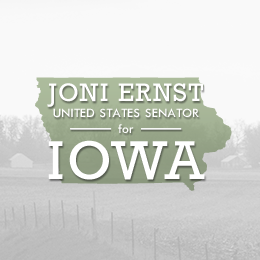Source: United States Senator Joni Ernst (R-IA)
WASHINGTON—During Women’s History Month, U.S. Senator Joni Ernst (R-Iowa), a senior member of the Senate Committee on Small Business and Entrepreneurship, and Senator Shelley Moore Capito (R-W.Va) are pushing legislation to empower women-owned small businesses.
The Empowering Women in Small Business Act would increase access to venture capital financing for women-owned small businesses through SBA-certified Small Business Investment Corporations (SBICs) and hold federal agencies accountable for meeting federal contracting obligations under current law for women-owned small businesses. It also requires a report from these agencies on the impact of inflation and supply chain disruptions on women-owned small businesses over the last three years, recommendations to increase access to capital, and to identify additional federal contract opportunities for women-owned small businesses. For a one-pager on the legislation, click here.
“Behind so many of our small businesses in Iowa are the hardworking women at the helm pushing them to succeed, so when we empower women, we empower our entire economy,” said Senator Joni Ernst. “This measure will increases access to capital for our women-owned small businesses and make sure federal contracting policies are being followed so we can give women every opportunity to thrive, grow their businesses, and support our communities and economy.”
“In 1994, the Small Business Administration set a goal to award 5% of all federal contracts to women-owned small businesses, however they have only met that goal twice. In 2019, women-owned businesses employed 10.1 million employees and generated trillions of dollars to support the economy. In West Virginia, 43% of businesses are women-owned. I’m proud to join my colleague, Senator Ernst, in introducing this legislation that would help expand access to capital and increase federal contract opportunities for women-owned small businesses in West Virginia,” Senator Capito said.
“SBIA supports removing all barriers to female entrepreneurs accessing capital,” said Small Business Investor Alliance (SBIA) President Brett Palmer. “We support Senator Ernst’s common sense legislation.”
“Women entrepreneurs are our nation’s greatest untapped resource,” said Liz Sara, President SCORE Foundation. “Access to capital by women business owners has been a challenge yet many opportunities exist in the both the public and private sector to make that path easier and dollars more attainable. Improving and increasing access to critical investment funds will enable many more women-owned businesses to compete, grow and succeed in their communities.”
The Empowering Women in Small Business Act would:
Allow women-owned small businesses (WOSBs) with priority federal contracting status to receive venture capital funding from the SBA’s SBIC network without losing priority contracting status for seven years.
Require training by the SBA/National Women’s Business Council for federal agencies that fail to award five percent of contracts to WOSBs and require these agencies to provide transparent guidance on how they plan to meet the five percent WOSB contracting goal.
Require federal agencies to submit a report to the SBA that includes a list of agencies that failed to meet WOSB federal contracting goals, the number of training sessions provided to these agencies, an overview of the content the training sessions provided, and the result of the training sessions, including the number of additional federal contract opportunities provided.
Require an interagency report by the Department of Commerce, in partnership with the SBA, Department of Agriculture (USDA), and the Treasury Department that includes the top economic barriers to access capital for WOSBs, a detailed description of inflation and supply chain disruptions facing WOSBs over the last three years, recommendations to improve access to capital, and identification of federal contract opportunities for WOSBs in partnership with the Office of Small Business and Disadvantaged Business Utilization.
Last year, Senator Ernst wrote an op-ed in the Cedar Rapids Gazette criticizing the federal government for failing to meet its five percent of federal contracting obligations to WOSBs, which has only been met twice since the goal was established in 1994.
###
